Issue Number 34, Fall 2016
Contents
- The Life of Trees by Dorianne Laux
- Our Real Name by Thomas Milligan
- Tree by Jane Hirshfield
- Ponderosa by Claudia Monpere
- Nurse Logs by Polly Brody
- Unorthodox Environmental Protection by John C. Weil
- Norco, California by Ryan Mattern
- Late February by Susan Kelly-DeWitt
- Tree-child by CB Follett
- Grieving the Brazil Nut Tree by Sruti Bharat
- The Apple Trees at Olema by Robert Hass
- A Young Woman, A Tree by Alicia Ostriker
- Jacaranda by Eileen Malone
- The Last Mulberry Tree in Florence, Massachusetts by Gail Thomas
- The Plum Tree by Gene Berson
- Prunus subcordata by Jeanne Wagner
- Capsula Mundi by John Smith
- Persimmon by Judy Bebelaar
- Hemlocks by Ken Pobo
- 1976 Gonzales, California by Kirsten Casey
- Sakura-no-sono by Linda Watanabe McFerrin
- Snow Pines by Linda Watanabe McFerrin
- Fall by Lisa Wujnovich
- Catalpa Leaves by Lois Marie Harrod
- The Widow Laments Another Autumn by Lois Marie Harrod
- Autumn by Marjorie Stelmach
- Pact by Marjorie Stelmach
- Retreat Log by Marjorie Stelmach
- Fortune by Mary Moore
- The Beauty of Black by Maya Khosla
- Tree Removal by Ted Kooser
- Taking Down The Locust by Barbara Crooker
- The Happiness of Trees by Michael Hettich
Archives: by Issue | by Author Name
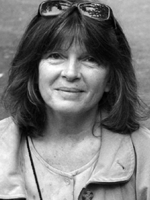
The Life of Trees
by Dorianne Laux
Dorianne lives in a neighborhood of Raleigh, NC, which was once a pecan grove and you can see vestiges of them in patches all around the neighborhood. She has a paper bark maple in the front yard that sheds full legal-sized sheets of bright red bark year round, a flowering dogwood, and smooth-barked crepe myrtles that line the street. In the backyard a shaggy 60-foot cedar towers above the house.

The pines rub their great noise
into the spangled dark, scratch
their itchy boughs against the house,
that moan’s mystery translates roughly
into drudgery of ownership: time
to drag the ladder from the shed,
climb onto the roof with a saw
between my teeth, cut
those suckers down. What's reality
if not a long exhaustive cringe
from the blade, the teeth. I want to sleep
and dream the life of trees, beings
from the muted world who care
nothing for Money, Politics, Power,
Will or Right, who want little from the night
but a few dead stars going dim, a white owl
lifting from their limbs, who want only
to sink their roots into the wet ground
and terrify the worms or shake
their bleary heads like fashion models
or old hippies. If trees could speak,
they wouldn't, only hum some low
green note, roll their pinecones
down the empty streets and blame it,
with a shrug, on the cold wind.
During the day they sleep inside
their furry bark, clouds shredding
like ancient lace above their crowns.
Sun. Rain. Snow. Wind. They fear
nothing but the Hurricane, and Fire,
that whipped bully who rises up
and becomes his own dead father.
In the storms the young ones
bend and bend and the old know
they may not make it, go down
with the power lines sparking,
broken at the trunk. They fling
their branches, forked sacrifice
to the beaten earth. They do not pray.
If they make a sound it's eaten
by the wind. And though the stars
return they do not offer thanks, only
ooze a sticky sap from their roundish
concentric wounds, clap the water
from their needles, straighten their spines
and breathe, and breathe again.
© Dorianne Laux
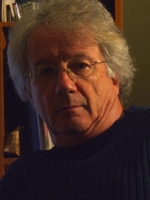
Our Real Name
by Thomas Milligan
Tom is a native of the Upper Susquehanna sub-basin, from which these poems appeared. He's recently relocated to the Puget Sound watershed in the Cascadia subduction zone.

The stillness of forests
is sirenlike;
it can reach deeper
than any familiar voice.
When we are senseless
with trying
to seize what moves,
with trying to make up
names for ourselves
out of a liquid earth.
And more is always moving
than we will understand,
and we cannot
help hurrying,
we cannot help our making
too much noise.
Then there is
a sound that stops us—
some small quadruped
underneath lastsummer leaves
learning to be the ground—
a sound like surprised
and probably hurt,
a sharp cry of consternation
and alarm.
There is always
ice in it,
the keen of grieving
and ruin,
the very voice of woe
which stops us
when we hear it,
for we know now we are marked,
and we know we have heard
the sound of our
real name.
© Thomas Milligan

Tree
by Jane Hirshfield
Jane lives on the southeast hem of Mount Tamalpais in the San Francisco Bay Area, in the company of several second-growth redwoods. She can often be found doing volunteer mounted patrol beside Redwood Creek, which passes through Muir Woods before meeting the Pacific Ocean at Muir Beach--the southernmost stream in California in which coho salmon can still be found.

It is foolish
to let a young redwood
grow next to a house.
Even in this
one lifetime,
you will have to choose.
That great calm being,
this clutter of soup pots and books—
Already the first branch-tips brush at the window.
Softly, calmly, immensity taps at your life.
Jane Hirshfield, “Tree” from Given Sugar, Given Salt. Copyright © 2001 by Jane Hirshfield. Used by permission of HarperCollins Publishers.
© Jane Hirshfield

Ponderosa
by Claudia Monpere
Claudia lives in the Oakland hills in the Temescal Creek watershed-- home to deer, turkeys, and an occasional mountain lion.

The pines, green triangles of light.
The pines, gathered at meadow’s edge
where rumors of drought have scorched the grasses.
To observe this particular light is to pray
to unexpected layers and dusty sediments.
Too long have the bones been stacked.
Longer than the birth of the first galaxy
there is that much grief.
The sky’s shawl unravels.
She knits and knits and still the threads
are naked, burn boiled in the grief pot
drenched in the surveillance of stars.
© Claudia Monpere
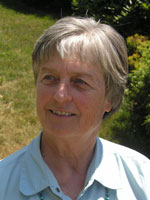
Nurse Logs
by Polly Brody
Polly lives in an exurban Connecticut town, about 500 ft. above sea level, about an hour's drive inland from Long Island Sound. Every year she listens from her window for the first chiming peep of spring hylas that give voice to a pond, just within hearing.

Stilled they lie—
long green combers
in the benthic shade
of rainforest floor.
Towering through centuries
into fog-wet air,
these Sitka Spruce and Western Hemlock
built histories—lean years and fat—
tales of themselves remembered
in heartwood’s dilations.
Rugged bark, slow to raddle,
resisted borer and fungus,
took lightning’s sizzling whip.
Yet even monuments come down
when years enough lay on.
Falling, each opens skylights
calling up new, frail green:
cushion moss, sweet fern, brambles.
Mould and insects soften trunks,
shape mounds of gentled pulp.
Wind drifts detritus down
and in this litter, cones germinate.
Rank upon rank, young conifers
raise the forms in which they root,
these long, prone swells, inspirited.
Previously published in The Spoon River Poetry Review.
© Polly Brody

Unorthodox Environmental Protection
by John C. Weil
John lives amid the great Pacific Watershed in La Jolla, California, where he has helped to acquire more than 70 miles of open space at the San Dieguito River Park, part of the Pacific Flyway known as the Yosemite of Southern California.

On a warm summer morning in 1965, when I was twelve years old, my mom heard a peculiar noise in the forest behind our house. It wasn’t the usual wind, the sharp snap of twigs, or the rustle of an occasional deer wandering into our unfenced backyard.
Mom’s concerned expression frightened me. She sat very still to listen. I gulped as she hurried outside with me in pursuit. A shabbily-dressed man rummaged around in the shadows of the pines just a few feet from our property line. I panicked because Dad and my older brother were at the hardware store.
The man was only 10 feet away holding a big roll of yellow ribbon. The scissors were pretty dull, so he kept trying to shred instead of cut. That rubbing of the scissor on the ribbon had made the ‘whirling’ noise Mom had heard. He tied a piece around the trunk of a big tree, then walked thirty feet to wrap a second tree. Each time he let the two ends hang like a kerchief. It looked like he was marking diseased trees.
Finally, Mom asked him what he was doing. “We’re building 120 houses,” he called out as he walked further away to mark another tree. We could hardly see him now. “I’m standing where a backyard will be. We’re saving one tree per backyard, which I mark with the ribbon.”
Oh, no, I thought. Our beloved woods were coming down. Hundred-year-old pines, maples, sycamores, all of it, coming down. The animals that wandered into the backyard would lose their homes. The deer that grazed at twilight, or licked at the salt block my parents put out for them in winter, would be wiped out.
“The houses will be there,” the man said, pointing just in front of him. The lots were obviously lined up like postage stamps. Mom knew right away that these would be tract homes, one right after the other, and only the exterior colors would change.
We walked despondently back to the house. We both knew that even Dad -- a man who could repair anything -- couldn’t fix this. But hours later he found out the name of the developer. Mom spent a long time on the phone with the man, but he refused to protect more trees. ‘Progress’ would soon bulldoze our beloved forest and change our lives forever.
The following morning, Mom and I drove quickly to the Five ‘n Dime. We always bought our stationery there. I assumed she was buying materials to make and blanket the neighborhood with flyers to organize a huge protest.
But minutes after we arrived home, the house seemed to vibrate. Two flatbed trucks carrying bulldozers rumbled past to a clearing just down the road. The men unchained the dozers. The metal against metal made a racket. Finally, they drove the huge beasts off the flatbeds.
We panicked. The dozers hit the ground with an enormous thud, then lurched forward, belching black smoke. The drivers let the motors idle for another ten minutes to charge the batteries. Mom was frantic. We both knew now that we were too late. The machines squatted like vicious dinosaurs as the drivers revved the huge engines and shouted to each other over the rumble.
Finally, they shut the dozers down. "Done,” one said to the other. “I’ll see you tomorrow.” They left in their pickup trucks. It was then that I fully understood the specifics of Mom’s plan. I had been wondering ever since we left the store. Mom had not bought paper to use for flyers. She had bought three big rolls of yellow ribbon, nearly a match for the ribbons affixed to the trees that were to be left standing.
Now we had the ribbon and scissors ready. I stood watch from the side yard while Mom waded into the forest. “Are you tying a ribbon on every tree?” I called out.
“No, then they’d know,” she said. “I can only put a ribbon on a few trees. But that’s better than what they planned to leave behind.” She cut and wrapped the first ribbon and moved on to another tree. For hours, Mom wrapped trees to be saved, designating two trees per backyard, groups of saplings and one tree on each likely front lawn.
As twilight came, she returned exhausted, dirt on her face, hair a mess. She clutched bare cardboard rolls and slipped her arm around me. “I had to try,” she said. She had wrapped about 360 mature trees. When we added on the 120 trees the developer had decided to save, that meant the new homes would feature about 480 trees, plus a couple hundred saplings.
Would this work? Only if the men operating the bulldozers had no idea how many trees were to be saved and only if trees were not marked on the plans. A lot of big ‘ifs,’ we realized.
That night we both tossed and turned. We just couldn’t quite believe this would fool them. In the morning I awakened to the throaty rumble of the two huge yellow bulldozers rocking back and forth, smashing trees. The violence was incomprehensible. Trees thumped the ground, shaking the windows on the house. We heard tearing, snapping, cracking roots being ripped from dirt and rocks. The roots rose up like hundreds of huge, arthritic fingers. Mom and I watched the carnage with tears in our eyes.
Each driver shifted long black knobs, pressed clutch, gas and brake pedals so the dozer plumed black smoke, rocked crudely, then rolled violently forward taking a tree with it. Wide tread prints like long patterns of braille led hundreds of feet into the forest.
The amount of dust was incomprehensible. We kept the windows closed. For hours we heard the sharp break of splitting tree trunks and branches. In no time the air thickened. After just a few minutes we completely lost sight of the dozers. A black and brown dust storm now blocked our view. We could only hear the bulldozers in the distance. But we could not see them or the trees anymore. We did not know if they were taking down our trees marked with yellow ribbon. I sat by the window staring at the thick black sky and feeling powerless.
Five hours later the rumbling abruptly stopped. An eerie silence lay over the neighborhood. I smelled pungent gasoline and exhaust. A cloud of dirt dust hung for the longest time, as thick as wool, dimming the sun. We still could not see a thing. My lungs ached with the dry dust, gasoline and burnt oil from the dozers.
Then I heard the men yelling to one another. They emerged from the black smoke -- faces filthy, hair coated with pine needles, plaid shirts soiled. They patted themselves off, high-fived each other, then drove away in their pick-ups. I was struck by how silent the pick-ups seemed compared to the abusive noise we had just experienced.
Now my entire family waited anxiously in the silence of the backyard as the dust slowly settled. Then we cringed at the awful destruction. Piles of felled trees extended acre upon acre. Roots were up-ended, holes in the ground looked like the aftermath of a bombing raid. I began to imagine the forest crying, hundreds of years of existence wiped out in a matter of hours. Yet to our utter surprise -- and joy -- two or three trees remained in each backyard, sometimes even four. In each front yard stood one big tree. The baby saplings Mom had wrapped were tenuously off to the sides, still standing, alone and thin, as if scared, but still alive. Each wore a fluttering yellow kerchief of survival. Piles of trees that were pushed to the sides towered above them. But we had won the battle of the trees. We had tied our yellow ribbons.
Today, when I visit my family, I like to walk outside to the backyard and look at the big trees that grace the sky. Indeed there are endless tract homes. The forest is gone. But in its place are the survivors, the trees saved by Mom. The saplings are now grown-up, and hundreds upon hundreds of trees still provide shade and homes to birds.
What she did might not be right for everyone. There is that side of the story. But in this case, the developer had refused to listen. Mom wanted to leave something for the animals and for the generations of people who would follow. What she did made an impression on me that I have never forgotten. She did not save the world, but she saved part of our world, and the results have lasted to this day.
© John C. Weil

Norco, California
by Ryan Mattern
Ryan lives on the Monterey Bay Peninsula, but grew up in the valley between Mt Baldy and Mt San Jacinto, on the San Andreas Fault and the Santa Margarita Watershed.

You are stuck in traffic. There is nothing to do
but ignore the world while it makes
you motionless. The air is working
and you are comfortable, just late.
You’ve found, like others, you are always late.
In front of you is a flatbed hauling
huge and fabled palm trees,
their roots wrapped in several towels.
You wonder where they’re taking them
and who would pay for them to be taken.
It seems so stupid to you, paying for them.
But suddenly you’re struck by these trees.
This is a motivated memory:
the sun exploding through the fronds
of the giant palm in your backyard.
The fat thing in the V of the fence,
as seminal to your childhood
as stink bombs and bare feet.
You are watching from the porch
while the city cuts it down –
it had grown too high, interfered with phone lines.
It took them all afternoon, firemen carrying
the huge leaves through the side of your house,
wheel barrowing the trunk, hacked to squares
with chainsaws, to the wood chipper out front.
Just before sunset you remember, while staring
at the stopped truck in front of you, the family
of pigeons who lined the fence that evening
and cooed until morning.
© Ryan Mattern
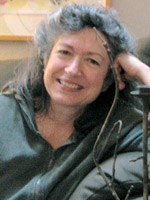
Late February
by Susan Kelly-DeWitt
Susan lives in the Lower Sacramento Watershed, about two miles from where the Sacramento and American Rivers meet.

Good
that the flowering pear doesn’t know
(the supple sprawl of its limbs, so swollen just now
with a twitchy flock of finches) that my gardening book defines
Pyrus
as a short lived tree
(although
the date and time of death, down to the last
milli-
second might be coded within
the cells of phloem.)
It flaunts
its fresh snow-bride clouds
of loose blossoming
against the thunder claps
and the gray sky.
© Susan Kelly-DeWitt

Tree-child
In some tribes, infants who died were thought to have been cheated of life. They were buried inside a tree in order to share its living.
by CB Follett
CB lives in the Mt. Tamalpias watershed in Marin County, CA.

Wombed cold in a cavity of Black Cottonwood
a child too young to catch a loose soul from the wind,
you were given to the secrets
of trees, sealed with tendrils and rough bark,
to take your living moments from wood, to gain
moisture and the small company of beetles,
to hear the sap as it courses
along cambium rivers, those tunnels near your left ear
that carry tomorrow from deep drinking roots
up along your sheltered body
to the knuckled joints of branches.
Long ago your flesh fell prey
to the mandibles of scavenging things, and cold,
and high winds flayed your past from you,
leaving alabaster bones doubled in a Q,
in the polished hollow of this tree.
The furrowed trunk closed round,
carrying bits of you upward toward resinous buds.
Someday, long from now,
when your hollow weakens the tree beyond standing,
when it breaks at the knees, where you lie curled
in quiet, then will your old bones fall out
into leaf rustles and you will be seen again,
a clutter of bone parts, no longer connected
but reluctant to let go.
First appeared in Echoes and then in author's book Visible Bones (Plain View Press).
© CB Follett

Grieving the Brazil Nut Tree
by Sruti Bharat
Sruti was born and raised in the large San Francisco Bay watershed and now lives in a rapidly-gentrifying and drought-stricken Oakland, a mile from Lake Temescal.

If you have ever traveled through nature with people who are attuned to its secrets, you know what I mean when I suggest that they can hear things most of us can’t. When my family spent three days back in 2012 in the Tambopata National Reserve – a vast tract of undeveloped Amazon rainforest in Peru – we were amazed at our guide’s abilities. We didn’t even notice the sound of water dropping, but he immediately recognized it to be a monkey’s subtle call; what we barely acknowledged as a piece of mud on the ground, he saw as a tarantula den. In the eco-lodge, we met individuals who had been transformed by their closeness to the rainforest. One employee, a PhD from Stanford, had discarded his old life and decided to teach yoga in the Amazon. He told me that the longer one stayed in a place like Tambopata, the more one’s powers of observation improved, and the more peaceful one felt.
This peace is at great risk. The Associated Press reported on November 21, 2015, that as many as half of the Amazon’s tree species are threatened with extinction because of massive deforestation. Among these species in trouble are Brazil nuts and mahogany. When I read this, my mind immediately flashed to the delicious snacks they gave us on bus rides, rich Brazil nuts rolled in sugar, coconut flakes, and cocoa powder. My fascination with the Brazil nut, though, comes not from its taste but its story.
The Brazil nut tree cannot grow outside of the Amazon rainforest; the nuts are harvested by hand once they fall from the tree. But this is not for lack of trying to bend the Brazil nut tree to Western control. Our guide told us about how savvy entrepreneurs saw the Brazil nut as an opportunity for profit. They researched the conditions, shipped the seeds to plantations in different parts of the world – Australia, Canada – and waited. Crop after crop failed. After losing incredible amounts of money, they realized they were missing something: the ecosystem.
Brazil nut trees are one part of the complex organism that is the forest. The pollination of the Brazil nut relies on a particular species of bee. Once the nut drops to the forest floor, its dispersal relies entirely on the agouti, a mid-sized rodent we frequently saw scuttling through the eco-lodge’s grounds. It rains nearly every day in the Tambopata, and the detritus of the forest floor provides a unique set of natural fertilizers for the tree. An entire economy relies on the manual harvesting of these nuts, which also provide vital nutrition for local tribal communities.
Conceptualizing the loss of fifty percent of the tree species in the Amazon is difficult intellectually; grief requires our senses and our imaginations. When I see one line in a newspaper article that mentions that the Brazil nut could go extinct, I think of the vast ecosystem the Brazil nut is part of. If the Brazil nut tree dies, so too do the bees. The agouti will lose its source of food. The local economy will be disrupted forever. A traditional source of nutrition will disappear. My memories of the agouti and the tall, majestic Brazil nut trees – along with the other vibrant, incredible organisms we saw, from the prehistoric clawed Hoatzin bird, to the hanging fruit bat colonies, the giant kapok trees, the snapping piranhas, all of which are connected in ways I will never know – these memories are what make the tragedy sink into my own heart. Perhaps the least important impact of such massive deforestation is the consumer who will not be able to eat her delicious coconut-coated snack. And yet anyone in the world who has tasted the sweet, fatty crunch of the Brazil nut has been – for a brief moment – a part of this fragile network. And to those who are left imagining what the Brazil nut might taste like, perhaps just the act of imagining the beauty of a tree that cannot exist without its community is enough to make anyone feel – for a brief moment – grief.
© Sruti Bharat

The Apple Trees at Olema
by Robert Hass
Bob lives in the hills above the east shore of San Francisco Bay.

They are walking in the woods along the coast
and in a grassy meadow, wasting, they come upon
two old neglected apple trees. Moss thickened
every bough and the wood of the limbs looked rotten
but the trees were wild with blossom and a green fire
of small new leaves flickered even on the deadest branches.
Blue-eyes, poppies, a scattering of lupine
flecked the meadow, and an intricate, leopard-spotted
leaf-green flower whose name they didn’t know.
Trout lily, he said; she said, adder’s-tongue.
She is shaken by the raw, white, backlit flaring
of the apple blossoms. He is exultant,
as if some thing he felt were verified,
and looks to her to mirror his response.
If it is afternoon, a thin moon of my own dismay
fades like a scar in the sky to the east of them.
He could be knocking wildly at a closed door
in a dream. She thinks, meanwhile, that moss
resembles seaweed drying lightly on a dock.
Torn flesh, it was the repetitive torn flesh
of appetite in the cold white blossoms
that had startled her. Now they seem tender
and where she was repelled she takes the measure
of the trees and lets them in. But he no longer
has the apple trees. This is as sad or happy
as the tide, going out or coming in, at sunset.
The light catching in the spray that spumes up
on the reef is the color of the lesser finch
they notice now flashing dull gold in the light
above the field. They admire the bird together,
it draws them closer, and they start to walk again.
A small boy wanders corridors of a hotel that way.
Behind one door, a maid. Behind another one, a man
in striped pajamas shaving. He holds the number
of his room close to the center of his mind
gravely and delicately, as if it were the key,
and then he wanders among strangers all he wants.
From The Apple Trees at Olema by Robert Hass. Copyright © 2010 by Robert Hass. Used by permission of Ecco/HarperCollins. All rights reserved.
© Robert Hass
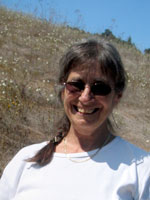
A Young Woman, A Tree
by Alicia Ostriker
Alicia lives in Manhattan Valley, formed by an east-west slash in the granite bedrock that goes downhill from Central Park west to the Hudson River. A stream once flowed down it; now wind from the river funnels up.

i.
The life spills over, some days.
She cannot be at rest,
wishes she could explode
like that red tree--
the one that bursts into fire
all this week.
Senses her infinite smallness
but can't seize it,
recognizes the folly of desire,
the folly of withdrawal--
kicks at the curb, the pavement,
if only she could, at this moment,
when what she's doing is plodding
to the bus stop, to go to school,
passing that fiery tree--if only she could
be making love,
be making poetry,
be exploding, be speeding through the universe
like a photon, like a shower
of yellow blazes--
she believes if she could only overtake
the rising rhythm of things, of her own electrons,
then she would be at rest--
if she could forget school,
climb the tree,
be the tree,
burn like that.
ii.
She doesn't know yet, how could she,
that this same need
is going to explode every September
and that in forty years the idea will strike her
from no apparent source, in a laundromat
between a washer and a dryer,
like one of those electric bulbs
lighting up near a character's head in a comic strip--
there in that naked and soiled place
with its detergent machines,
its speckled fluorescent lights,
its lint piles broomed into corners,
as she fumbles for quarters
and dimes, she will start to chuckle and double over
into the plastic basket's
mountain of wet
bedsheets and bulky overalls--
Old lady! she'll grin, beguiled at herself,
Old lady! The desire
to burn is already a burning!
How about that!
iii.
Meanwhile, the maple
has also survived, and thinks
it owes its longevity
to its location
between a bus stop
and a bar, and to its uniquely
mutant appetite for pollutants:
carbon monoxide, alcohol, spit...
the truth is, it enjoys city life.
Regular working people suffer so grossly
it makes a tree feel happier
having nothing to do
but feel its thousand orgasms each spring,
or stretch its limbs during the windy days
that are like a Swedish massage,
or swoon into the fall
among its delicious rain patters,
its saffron and scarlet flamings.
Then, when the tethered leaves
Snatch themselves away like desperate
children ardent for freedom,
it will let itself sigh, feel wise
and resigned, and draw
its thoughts downward toward its other crown,
the secret leafless system
that digs in dark
its thick intelligent arms
and stubborn hands
under the shops, the streets,
the subway, the granite
the sewage pipes'
cold slime,
as deep as that.
© Alicia Ostriker

Jacaranda
by Eileen Malone
Eileen lives in the fog of the San Francisco Coastal South Watershed.

Overturn your wheelbarrow
full of pale-purpled damp jacaranda leaves
lie down with me, naked, here in the garden’s
morning of raspberry drizzle
between fresh worms rooting in yeasting earth
among the rosy fragrance of fallen apples
broken to reveal their cores, their stars of seeds
flood me, bury me in strawberry and lake water
give me your lips, kiss me in amaranth, jasmine
open your mouth with its small startle of dark spikes
like shark teeth straining, let me swim to you
surrender to the current
let us peel away this false dawn from dappled things
bejangled roots, ferny, riffled leaflight, as I embrace
your naked waist on a bed of purple leaves up from
this lush pile of the jacarandas’ lavender snow
a crush, a compost mulch of now, of all that is left
of what once was early.
© Eileen Malone

The Last Mulberry Tree in Florence, Massachusetts
by Gail Thomas
Gail lives near the oxbow of the Connecticut River along a flight path for hawks, eagles and herons.

It survives in a lopsided tangle next to
the ball bearing repair shop across from
the plastics factory that used to be a silk mill.
That was when the abolitionists
said, No cotton in this town, and Sojourner Truth
drew crowds at Cosmian Hall. She settled
into a little house next to long-haired
communal types, white Unitarians, conductors
on the underground railroad who wanted
to change the name of the river to Arno
because Italian worms produced such fine silk.
Children stayed alert for the wriggling, green
bodies that earned coins, and purple
stained the sole of every boot.
From Waving Back (2015, Turning Point).
© Gail Thomas

The Plum Tree
by Gene Berson
Gene lives in the northern California foothills in the Yuba River watershed. Everyone goes to the river. Like a temple, with its falls its rapids its green pools, it seems to restore everyone in a personal way. We feel our kinship through it.

My father liked to sit in the backyard
next to his little plastic fountain
near the bamboo, sipping a highball
his French cuffs folded back glowing like gardenias
following the orange satellite of his cigarette in retrograde
when he took a drag in the darkness
the night warm
the plum tree full of stars.
© Gene Berson
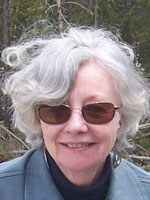
Prunus subcordata
Native Wild Plum
by Jeanne Wagner
Jeanne lives on the east side of San Francisco Bay with Cerrito Creek, and the canyon it forms, in her "backyard," where black-tailed deer, turkey vultures and a dwindling population of raccoon and possum still roam.

The plum trees are effervescing again,
nudging their ruction of buds
too close to my window,
pushing at me with their promiscuous beauty,
ravenous as fire in its own way.
All the fissions of nature at work.
I can guess why my neighbor
wants to cut them down,
the cells in his blood, called blasts,
indecently raging, while he talks about
how trees draw lightning;
last year an acacia fissured down the center,
exposing what used to be symmetry
into a splay of roots so unseemly
he could barely stand to look.
Now he tells how me I should give
all my plum trees the chop;
they’ve become too crazy, too rife.
Spring spreading its usual shrapnel of blossoms,
but in a few months, mark his words,
there’ll be wild plums so small
they’re passed off as cherries, skin broken
and bitter-sweet,
their juices smearing the deck,
whole families of deer gorging on windfall.
I want to tell him I’ll miss the way such fullness
makes the slender limbs loop down.
Trees so rampant with crimson they blaze,
their branches bursting like the shivery plumes
of those fireworks they call Peony,
Ground Bloom, Willow,
as if even our gardens combust.
First published in Fourth River Review.
© Jeanne Wagner
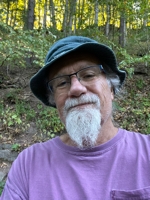
Capsula Mundi
by John Smith
John lives on the New Jersey side of the Delaware River in the Lower Delaware watershed.

When I first heard
of capsula mundi
world capsules
egg-shaped burial pods
made of biodegradable starch
planted in cemeteries
instead of caskets
and seeded
so that the body inside
fertilizes a tree
and funereal plots
become starter beds
from which the dead
rise as woods
convert a graveyard
into a forest
I wanted to be sown
nourish a sycamore
by a river
or a willow
but not for the weeping
rather the breeze
through my hair
or a birch tree
for the un-peeling
like pages of a book
opened by fire
anything other
than boxed in a casket
or ashes scattered
on wind and wave
I would rather
be left out in the open
and torn apart by vultures
not afraid to be feed
but to be part of a forest
would be marvelous
maybe a maple
with strong limbs
for climbing
and a green head of hair
full of whirligigs
and shade.
Previously published in Spillway.
© John Smith

Persimmon
by Judy Bebelaar
Judy lives in the Derby Creek Watershed in Berkeley, California, between Derby Creek, which was long ago paved over, but still flows beneath the streets, and Claremont Creek, which runs down from the hills.

In the snapshot he balances it
on his bald head,
the smile under that glowing fruit
complicated.
After the chemo all his thick brown hair
fell out in clumps in the shower
over a few days.
I can see him, before he got sick,
his hair tamed into a pony tail by a rubber band.
I laughed when he told me
that one of his students, a girl
in his English class at Richmond High,
asked if she could touch his hair:
Why Mr. B, your hair is nappy like mine!
I bought, as a present for him,
a persimmon tree.
He loved persimmons,
loved to see the orange fruit
on bare winter limbs.
The last year that tree,
transplanted three times,
bore the most fruit it ever has.
Soon it will be older
than he was
when he died.
Soon the leaves will burnish
then fall ,
as they always do,
in a bright heap
over the few days
before the inevitable chill settles in.
© Judy Bebelaar
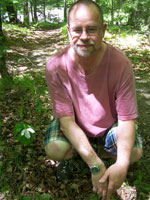
Hemlocks
by Ken Pobo
Ken lives in the Lower Delaware River watershed in southeastern Pennsylvania.

Mom’s gone, the path full
of last autumn’s leaves
and her kindness. In the spring
forest, a stand of hemlocks
(growing when I was a kid)
almost 100 feet tall.
A black-throated green warbler
tends her nest. Gray bark,
as if November painted
the trees her favorite color.
Stillness. Pinecones
lump the forest floor,
soft needles under our shoes.
© Ken Pobo

1976 Gonzales, California
by Kirsten Casey
Kirsten lives at the top of Banner Lava Cap Mountain, once a volcano. Her home is minutes from Scott's Flat Lake, and less than an hour from the Yuba River in the South Yuba River watershed.

This is not Italy, not these golden hills
tangled with the reaches of oak
that click with worms at the end of summer.
Two rows of eucalyptus trees line a dirt road.
The air is dry dust, tastes like the color brown.
Our fingernails are packed with farm dirt.
As we walk between perfectly spaced tree towers,
their pods fall like oxidized amusement park tokens,
thrown from a pier by a child, now washed
into barnacle beauties—rough and scented.
The pomegranate tree, shoulders sloped,
arms weighted, is dressed in heavy spots,
a rash of red. Every hanging circle is more
than an ornament, each is a swollen berry
ripe with its own secret fruits.
When halves are torn, two clusters of crimson
arils stain our chins and fingertips
a more delicate shade of blood,
the lipstick of childhood.
© Kirsten Casey
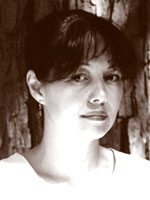
Sakura-no-sono
by Linda Watanabe McFerrin
Linda lives near the eastern shore of the San Francisco Bay.

It was early Spring in your uncle's cherry orchard,
blossoms -- pink.
The last time you were there, you
wore high-heels
for the first time --
just sixteen.
This time you were running.
The raw cold, drawn in
with every breath,
a knife blade driving
deep into your chest.
Nose bleeding from the effort,
you tasted salt.
And all around you, the cherry orchard
was ablaze,
a maze of black-trunked trees
like torches dipped in rags and oil
and lit.
American bombers whined overhead,
fat insects swarming.
Your arms, like skinny leather wings,
cranked at your sides.
You ran, earth-tethered, knees shaking.
And you saw the man beside you running, headless,
30 yards before
he fell as you
were running
on and on
toward an invisible finish line.
And the branches of the cherry trees were lit
with flames,
the sparks—petals of fire, carried
on the wind.
© Linda Watanabe McFerrin

Snow Pines
by Linda Watanabe McFerrin
Linda lives near the eastern shore of the San Francisco Bay.

The lodge pole pines
look Japanese,
their green needles,
stiff with snow,
suggesting the beards
of oriental hermits.
On the third floor of the chalet
they are still crowding the windows.
I cannot think of their heads
except in conjunction with stars.
Snow makes its point incessantly,
goes on talking to itself.
The trees shudder,
clearing a space
for their shoulders.
Soon not even this gesture
is possible.
Things move grudgingly.
White, like a great wall,
climbs.
© Linda Watanabe McFerrin
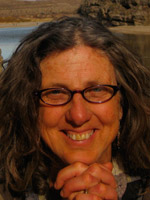
Fall
by Lisa Wujnovich
Lisa lives, farms, and writes poetry at Mountain Dell Farm on the New York side of the Delaware River Basin.

Catbird angry in the rosehips,
we cocktail in cypress chairs,
edged on the equinox pond,
dimpled leaves: each a closed mouth.
Giant deciduous capillaries pinned
and dissected to a blue papered sky.
Autumn floats, rounding the corner;
death I see as when, no longer how.
The next thing I know friends leave,
and alone, I follow thoughts, stalking
car lengths behind, turn and head home.
I suppose you get used to anything:
behind pine needles, highway drone,
throbbed ache, evergreens trembling.
© Lisa Wujnovich

Catalpa Leaves
by Lois Marie Harrod
Lois lives in the Stony Brook watershed in Hopewell, New Jersey, a sweet little town that has been here since the l8th century. Though close geographically, it seems far from the turnpike-oil-refinery New Jersey.

The catalpa is emptying
like a theatre
from which no one is in a rush,
leaves floating like prayers at a Quaker meeting,
one . . . one, three. . . a breath . . .
two more detached and solemn
as I once wished my parents would take leave . . .
as my heart is leaving now
lilting its way through this branch
and those, what do I love?
Not the dress of the dry ballerina,
its odd stiff grace
not this orchestrated meander,
the coffins dawdling down.
© Lois Marie Harrod

The Widow Laments Another Autumn
by Lois Marie Harrod
Lois lives in the Stony Brook watershed in Hopewell, New Jersey, a sweet little town that has been here since the l8th century. Though close geographically, it seems far from the turnpike-oil-refinery New Jersey.

He planted trees
to make new this world–
as many as our plot
could bear.
For he was that kind
of man, one who
husbanded his acorns
against the sky descending.
Seed against sorrow,
he said, shade to cool
the warming woe.
The little we can do.
But he did not
foresee the fall out
of his un-wiving–
the thousand leaves.
Unsweatered and bare-armed
I rake and rake.
I do not know why
I live so long.
First published in Weatherings, ed. David Chorlton and Rober S. King. Lexington, Kentucky: FutureCycle Press.
© Lois Marie Harrod

Autumn
by Marjorie Stelmach
Marjorie lives just below the convergence of the Missouri and Mississippi Rivers where repeated widespread flooding and urban expansion prompted the forming of a Conservation Partnership which has since implemented the setting aside of 21,000 acres of private land and enhanced 8,000 acres of wetland habitat for migratory and nautical birds.

Soon again the dead will outnumber
the living. Last night the moon was fat. I dreamt
so many dreams, and all were death. I can’t guess
where green goes. Sucked back under
the earth to brood and bear a brash, relentless crop
of weed and wing? Or into the sallow sky to drop
a pale green dusk or help a wan sun rise again,
a sickly dawn?
And what a wilderness to mourn in:
curbs lined with the rotting dead; this wailing in the wind;
the severed hands of sycamores awash downriver
bereft of wrist or limb. Just where
in our faith or physics did we ever consider
what would come of this veined, green
benediction suspended above us all summer?
From Bent upon Light (University of Tampa Press, 2006). First publication: Poet Lore, Fall 1998
© Marjorie Stelmach

Pact
by Marjorie Stelmach
Marjorie lives just below the convergence of the Missouri and Mississippi Rivers where repeated widespread flooding and urban expansion prompted the forming of a Conservation Partnership which has since implemented the setting aside of 21,000 acres of private land and enhanced 8,000 acres of wetland habitat for migratory and nautical birds.

As nights chill and their bite deepens,
the deciduous masses loosen their hold,
and now, from the far side of the easement,
houses emerge we haven’t seen all summer—
homes like our own, built largely of timber
felled, hauled, cut and planed. Sold in bulk.
Placed and nailed. Insulated. Sold again.
Rain has fallen straight down for days,
as if intent on rootedness. Leaves,
already compressed in the hollows, seal
an ancient Masonic pact,
laying a mortar between our world
and the Under-, where shades of return
are stored for the winter.
Now cold descends. We move indoors.
There, ringed by planks of their dead,
we pass the winter, having long understood
that, in return for their steadfast care,
our children must tender—and sooner
than we’d wish—
our flesh.
© Marjorie Stelmach

Retreat Log
by Marjorie Stelmach
Marjorie lives just below the convergence of the Missouri and Mississippi Rivers where repeated widespread flooding and urban expansion prompted the forming of a Conservation Partnership which has since implemented the setting aside of 21,000 acres of private land and enhanced 8,000 acres of wetland habitat for migratory and nautical birds.

—the trees keep
a respectful distance
(a reticence not unexpected
in ones so tall).
—as we talk our way into the graying light
in the shadowy lodge,
our eyes are the first
to fall out of color;
our voices,
so well-intentioned,
drain
of certainty,
catch themselves
just short of assertion.
—we’ve come, over hours,
to a lessened awareness of our selves,
come gradually to sense
the gradual reduction
of our faces to likenesses
under-lit by candlelight;
have persuaded, somehow,
the night to grant us
permission to go on living, despite
so little presence remaining.
—night’s subtraction enlarges our vision
to meet the more difficult
discernments,
teaching us the variousness
of lives we might have lived instead (these,
and these);
leaving us mildly
surprised
at the way our bodies
accommodate us over time:
distinctly lit, then limned,
then limitless, as if
our voices arose from minds
independent of us.
—and the trees, who do this every night,
pause in their negligent brushing of
the Eternal,
to consider again
(as earth unrolls dark lubricants
to ease the bearings of the stars)
with a grave
and generous attention,
us—
the likelihood of a human soul.
From Bent upon Light (University of Tampa Press, 2009). First publication: American Literary Review, Fall 2007
© Marjorie Stelmach

Fortune
by Mary Moore
Mary Moore, who grew up among orange groves of the South Coast Water Region in California, now lives in the Ohio River Valley near Four Pole Creek in the Guyandotte Watershed.

The landscape cleaves to the future,
a cascade of wooded ridges and views
going forever, implying it too, but the straggling
rows of trees, poplar, maple, oak,
wanderers who rooted where they fell,
are not clues to a future but gambling's
green markers, droppings grown up into real trees
and pledged to yield more, like Mendel's
smooth and creased seeds, the look of which
distinguished the luckier kinds of peas.
The beautiful pews of the ridges aligned
behind the park invite me.
Clouds perch on the fortunate
trees. Luckily, chance is my church.
© Mary Moore

The Beauty of Black
by Maya Khosla
Maya lives near Copeland Creek, which is a part of the Russian River watershed in Sonoma County.

The first tinge of light lifts an uproar out of the mountains – buntings, bluebirds, wood peewees, tanagers, robins and woodpeckers, all calling eagerly. And, in the distance, a mountain quail’s exclamations. The light grows opalescent, revealing trees stripped bare as ship masts afloat in a sea of young leaves. They stretch on for miles, down one slope and up another. These are snags, standing dead trees. Wearing thick cloaks of charcoal they stand gathered by the hundred, as if in conference.
In the summer of 2013, the Rim Fire set Yosemite and Stanislaus National Forest ablaze. A mosaic of fiery intensities crackled through the lush forests – more than 400 square miles when all was over.
Not over – a new beginning. Where the fire brushed by with low intensity, great expanses of cedar and fir and pine were blackened from their base up to eye level or slightly higher. Most of those trees remained green; their forest floor layered with ash and burned detritus. Two springs later, the earth is packed with wallflowers and all manner of saplings. Northern goshawks have chosen to raise their chicks in one grove, spotted owls in another – the highest forms of praise rare raptors could ever give to a post-fire forest. And the soft footfalls of black bear and deer can be heard as they forage on the new growth.
On slopes where the fire burned hotter, it left the ship masts – snags charred-black on the outside with solid wood on the inside. The snag forest too is crammed with all manner of life, which came as a surprise as their treasures were unknown to me. But the birds have known for eons, and the insects for even longer. Their knowledge is so ancient that veritable rivers of birds ride in after the rivers of insects that swarm into the tell-tale flow of smoke after fire. The smoke of ancient lightning fires runs through the instincts of insect and bird, like a familiar language. Beetles arrive to lay eggs on the snags and the eggs hatch into worm-like larvae that chew their way through bark and wood. These larvae are bread and butter for rare black-backed woodpeckers, pioneers among the snag forests they make their home. Woodpeckers, like the black-backed, the white-headed and the red-breasted sapsuckers, drill and carve and bevel fresh cavities out of the forest of ship masts – and finally decide on one to call home. That leaves their unused homes for bluebirds and nuthatches and squirrels that are drawn into the brand new forest. They switch and flicker from perch to perch and their excited singing voices pronounce the infinities of sunlight as world.
But deep in these mountains, there are lives slipping away from us every day. They have evolved with fire for millions of years. Over 80,000 acres of post-fire forests are being logged right now. Perhaps their departure is marked by great sounds, a falling from beauty. Perhaps their protests go unheard. That they are irreplaceable is for certain. Far in the back-country, they may go unnoticed for days or whole seasons.
By the time we shake ourselves awake to walk their country, it may feel like something halved, trying to learn to be whole again. It may feel tentative, like a song with its chorus sliced off. As more and more of us grow to value the beauty and richness of post-fire forests, we will learn to save them.
For now the earth is clinging damply to its half-darkness, as I cling to my three layers to stay warm. The first touch of sunlight sticks to tops of the ships masts like honey. New pine needles glitter from the tips of some burned trees. The birds grow busier, replicating the forests’ filigrees of green in sound, building nests. Rejuvenation is at work everywhere.
When sunlight spills down the sea of leaves is suddenly dazzling, an almost fluorescent blend of miner’s lettuce, dogwood, paintbrush, lupine, unfurling fern, and sapling of oak and conifer in numbers dense as constellations. One look down and I must swiftly lift my foot before it touches earth— a comical reversal that just about throws me off-balance. Two conifer saplings are underfoot.
Down the slope, a snag is ringing with cicada sounds. It stops when I stop. So I slip behind a large stump and allow fifteen to minutes creep by.
A black-backed woodpecker alights on the snag. Black on black, he virtually disappears – all but a bright spot of gold on his head. The high-pitched cicada sounds begin again with gusto.
A noodle-like larva flails around in his beak as the woodpecker rappels scratchily down the burned bark. He pauses at a round, perfectly beveled hole, where a baby black-backed woodpecker shrills like a cicada, barely able to contain its exhilaration. Within three seconds, the adult has stuffed food down his baby’s still-singing gullet – and vanished.
© Maya Khosla

Tree Removal
by Ted Kooser
Ted lives on an acreage outside the village of Garland, Nebraska.

First the boom truck offers its cup
to the sixty-foot elm, just a sip
from a cheap white plastic mug
after all those years of service
fishing for weather. Then follows
wave upon wave of the chain saw,
a hot spray of sawdust.
But the tree makes its exit with grace,
going down slowly, one piece at a time,
hauling in the cool net of its shadow
and patiently folding it
into the boat of the clouds.
From Splitting an Order, Copper Canyon Press, 2014, with permission).
© Ted Kooser

Taking Down The Locust
by Barbara Crooker
Barbara recently moved to an apartment in a retirement community in rural northeastern Pennsylvania facing wetlands and the Little Cedar Creek.

If the builder hadn’t
planted it there
in the first place—
too close to the house
and right over
a terra cotta
sewer line—
we wouldn’t be doing
this today, deconstructing
the locust limb
by limb, but we are—
Paul Bunyan with
a chainsaw has just scaled
its height, and is lopping
off arms, legs, letting
them drop to the drive
where his buddy
feeds them to the shredder,
turns them into mulch.
When only the trunk is left,
he slices thick segments,
tosses them in the truck.
Maybe they’ll warm
someone’s February nights.
But now what remains
is what’s not there—
the double-compound leaves
that filtered July suns,
the shower of gold
on the driveway each October.
The pool of shade.
What remains
is a tree of air,
where no wrens scold and scold
in the highest branches
that the wind doesn’t toss,
where the sun doesn’t set
down its burden of light,
where there is no black net
to snatch the moon
as it flutters by.
From Small Rain (Purple Flag Press, 2014).
© Barbara Crooker
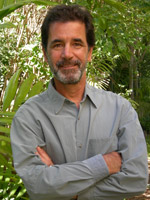
The Happiness of Trees
by Michael Hettich
Michael lives on the Atlantic Coastal Ridge in the Biscayne Bay Watershed of South Florida, a mile west of Biscayne Bay.

I slept that summer on a screen porch in the woods
with the creatures and insects singing so loudly
my mind seemed to join them—out there without me—
to move around like a breeze from form to form
and then to return as a fox or a cicada,
some other night creature, to slip back inside me
humming whatever it had heard, patterns
I couldn’t sing along with but felt inside
like the happiness of trees when a soft wind
turns their leaves’ pale underbellies up to the sky
and makes the sap rise. I loved to wake
before myself, to silence and fog.
Sometimes I got up and walked out into the chilly woods
and sometimes I turned over as though this happiness
might last forever, and slept just a while
longer, until the first birds sang.
© Michael Hettich